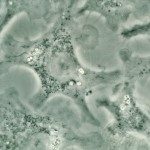Lien vers Pubmed [PMID] – 17118979
Infect. Immun. 2007 Feb;75(2):830-7
Toll-like receptors (TLRs) are involved in the sensing of microbially derived compounds. We analyzed the contribution of these receptors to cytokine production by macrophages following stimulation with whole bacteria. Using knockout mice, we confirmed that the TLR4 and TLR2 contribution was predominant in the induction of tumor necrosis factor alpha and interleukin-10 by gram-negative bacteria. In contrast, the absence of TLR2 and/or TLR4 or TLR9 did not affect the response to gram-positive bacteria. In the absence of TLR2, phagocytosis was essential for cytokine production in response to heat-killed Staphylococcus aureus (HKSA). Because intracellular sensing was important in the absence of TLR2, we evaluated the contribution of Nod1 and Nod2, intracytoplasmic sensors of peptidoglycan-derived muropeptides, to the response to HKSA. By transfecting RAW 264.7 macrophages with dominant negative (DN) forms of Nod1 and Nod2, we showed that both molecules inhibited NF-kappaB activation in response to HKSA. The unexpected interference of DN Nod1 in the response of macrophages to gram-positive bacteria was confirmed with a Nod2 agonist (muramyl dipeptide) in transfection experiments with HEK293T cell. Taken together, these results show the contribution of phagocytosis and Nod molecules to the response to HKSA in macrophages and also identify possible cross talk between Nod1 and Nod2.

